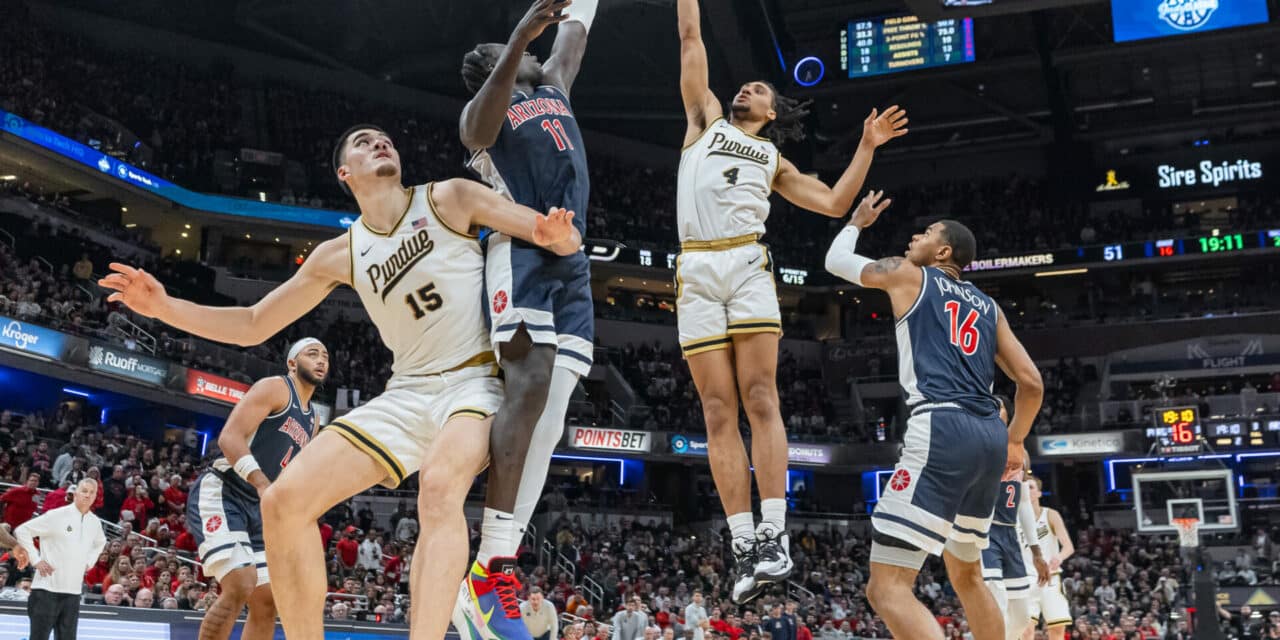MADNESS: Gainbridge Fieldhouse in Indianapolis, shown during the second annual Indy Classic on Dec. 16, will host first and second round NCAA men’s basketball tournament games in March. (Getty Images)
The march to the championship at the highest level of NCAA men’s basketball takes practice to keep college players big game ready, which requires extra accommodations with multiple teams in town at the same time.
“These teams are used to practicing every day, so when they come on site they want to continue to do that,” said LJ Wright, director of Division 1 Men’s Basketball Championships. “We make sure we have alternate venues for them to get some shots up or do whatever it is they need to do as a team because they can’t all get access to the actual competition floor every day.”
March Madness begins with Selection Sunday on March 17 and the announcement of the 68 participating teams. The elimination tournament culminates with the 2024 Final Four and the title game on April 8 at State Farm Stadium in Glendale, Arizona.
The first and second rounds of the competition have open practices for fans to come in and watch their teams prepare.
“On an open practice day, teams don’t necessarily show all of their tricks or what they are working on,” Wright explained. “They don’t run some of the offenses that might be new, or things like that in front of fans because they don’t want their opponent to find out what’s going on.”
The solution is finding an alternate site for closed practices. In host cities, Wright said they rely on a network of coaches, conference and the participating venues to recommend off-site practice courts. For the first and second round that could be between four and six practice sites, typically at local universities or occasionally a high school gym.
“We want it to be a secure area where they don’t have folks standing around watching them practice,” Wright said. “We are very much hands off for those alternate practice facilities.”
The teams control their own schedules and provide their own equipment.
“For Big 10 basketball tournaments and when there are games for the NCAA in Indianapolis, Butler always tries to be welcoming in terms of providing our Hinkle Fieldhouse to teams as a second practice facility,” said Jon Dedman, associate athletic director at Butler University. “There are things they don’t want to show the public during open practices, and honestly, some coaches like a little bit more time.”
Dedman said the men’s basketball team has experienced the other side of the equation.
“When we are in New York City for the NCAA tournament, or any other city, we are always trying to find partners that allow us to come into their court and we try to do the same thing,” Dedman said. “It’s about tying to be a good partner.”
In Indianapolis, Indiana University-Purdue University Indiana is part of the tournament host group, along with Horizon League and Indiana Sports Corp. for first and second round play at Gainbridge Fieldhouse March 22-24.
The school routinely opens the 65,000-square foot IUPUI Athletic & Fitness Center to traveling teams.
“It goes back to relationships,” said Ed Holdaway, senior associate athletic director at IUPUI. “These coaches all know one another. For instance, Purdue will likely be in Indianapolis given the strong season they’ve had, so it’s not uncommon for Purdue to reach out two months ahead of time and say, ‘Hey, if we happen to be sent to Indianapolis for our first and second round games, could we get into your facilities and get some closed-door practices?’”
IUPUI accommodates requests as best they can and as many teams as they can. They provide basketballs, towels and water for visiting teams, but draw the line at taking practice time away from their own teams.
“Those relationships are important across the landscape of college sports,” said Holdaway, who has been at UIPUI 23 years. “You never know when you may need a favor from someone else. We try to be a good partner to as many people as we can.”
During his tenure, Holdaway said the university has hosted first and second round teams and the semifinals at least 15 times, but they field requests throughout the year.
“I don’t want to over emphasis it,” Holdaway explained of hosting visiting teams. “It’s certainly helpful and it’s beneficial and it can be an important resource, but these teams are so well drilled, particularly by March. They are used to being in a hotel. They are used to practicing and training on the road. So, they are very well versed in what a routine looks like.
“But sometimes it helps to have someone in your corner. Someone who will lend a hand and provide a favor, and we take pride in being able to do that.”







